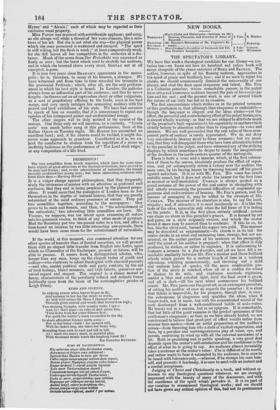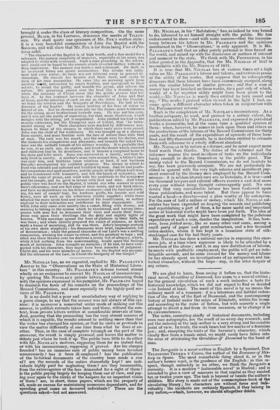THE SPECTATORS LIBRARY.
WE have this week a theological candidate for our library—a sec- tarian too—we know not how its heretical red calico back will range alongside of the grave exteriors of SEED and SECKER. The author, however, in spite of his flaming uniform, approaches in the spirit of peace and brotherly love ; and if we were to reject his claims, we should unnecessarily diminish the universality of our library, and shut the door upon eloquence and talent. Mr. Fox: is a Unitarian preacher, whose remarkable powers in the pulpit have attracted numerous auditors beyond the pale of his congrega- tion and his sect ; and the present work is one of several which the nature of our duty has led us to examine. The first circumstance which strikes us in the printed sermons of this gentleman is, that although their eloquence is undeniable— though the language is elegant and the ideas choice—yet the effect, the powerful and overwhelming effect of his pulpit harangues, is almost wholly wanting : so that we are obliged to attribute much of the preacher's high reputation to his superiority in matters which strictly belong to elocution rather than to eloquence—to voice and manner. We are well persuaded that the real value of these com- ponent parts of oratory is rarely appreciated. We do not deny very considerable literary merit to these sermons ' • but we main- tain, that they will disappoint those who have been attracted to listen to.the preacher in the pulpit, and have witnessed any of the striking displays by which sometimes he deigns to dazzle the imaginations of the dwellers in the north-eastern quarter of the metropolis. There is both a voice and a manner, which, at the first submis- sion of them to the senses, absolutely produce the effect of repul-• sion, and; yet subsequently obtain a victory over the auditor, the more sure, by his having begun by throwing himself off his guard against seduction. It is so with Mr. Fox. His voice has much metallic sound, but it does not strike the hearer for the first time as musical or well-modulated. CURRAN is always quoted as a grand instance of the power of the real orator in struggling with and utterly overcoming the personal difficulties of ungraceful ap- pearance and awkwardness of bearing. Mr. Fox's person, and his manner of managing it, may be added to the example of Mr. CURRAN. The manner of his elocution is also, to say the least, singular; and, if attractive, it is most insidiously so : it is like the taste of the olive, agreeable only when the full force of it is fading on the palate. It is, in the first place, entirely artificial: nature can claim no share in this preacher's graces. It is formed by art and pains, on a style originally vicious, and which the orator found it more easy to convert than to eradicate. If this be so, he has, like the alchymist, turned his copper into gold. This manner may be described as epigrammatic—its charm is in its tail : the orator dwells in an even and undulating tone, strange, but not un- musical, on the earlier portion of his sentence or his paragraph, until the mind of his auditor is prepared : when that effect is duly produced, he strikes, or rather he explodes. It is unbecoming to compare a sermon to a feu dart/ice, and yet we have felt a re- markable similarity between Mr. Fox's manner and those brilliant wheels . which gyrate for a certain length of time in a uniform splendour, whizzing monotonously, and throwing out a mild and uniform halo of sparks, till the more combustible por- tion of the circle is reached, when all of a sudden the wheel is shaken to its axle, and explosion succeeds explosion, amidst a blue and celestial light, until the final crack is given, and all is dark—till the next wheel commences his brilliant round. Mr. Fox possesses the great art, in an extempore preacher, of setting his auditor at ease as regards the preacher : it is clear that failure is impossible, for his progress, though slow, is sure : the vehemence of eloquence only qualifies the close, when it bursts forth, not in noise, but with the concentrated sound Of the cork discharged from a well-conditioned bottle of Soda-water. He bursts not in a maxim, but in an epigram. It is remarkable, that but little of the point remains in the printed specimens of this gentleman's eloquence ; so that, as we have already hinted, we are constrained to believe that great part of effect results rather from manner than matter—from an artful preparation of the auditor's senses—from throwing him into a state of excited expectation, and then, by a peculiar and contemporaneous play of voice, eye, and person, contriving to wind up with all the external assurance of a hit. Both in preaching and in public speaking, a very great deal depends upon the orator's self-satisfaction and his confidence in the effect of what he is going to say. An audience almost invariably takes a sentence at the orator's value : if he is diffident of its worth, and rather waits to hear it estimated by his audience, he is sure to be heard with tolerance only,—whereas, if he stamps his coin him- self, and presents it fearlessly, it is sure to meet-with an instant and a cordial acceptance. Judging Of Christ and Christianity as a book, and without re ference to any theological questions whatever, we are strongly impressed with the beauty of many of the discourses, and.with the excellence of the spirit which pervades it. It is no part of our vocation to recommend theological works; and we should not have given any critical opinion of this, bad not its pretensions brought it under the class of literary composition. On the same ground, BLAIR, in his Lectures, discusses the merits of TILLOT- SON. We shall quote one specimen of Mr. Fox's written style : it is a very beautiful compari§on-of John the Baptist with.the Saviour, and will shew that Mr. Fox is thr from being Vox-et P re- terea Whit.
"The character of the Baptist is of high worth, and a fine model for a reformer. His austere siMplicity of manners, especially at his years, was adapted to strike with reverence. Such a man preaching in the wilder- ness could not be heard by the crowds which resorted thither without a deep impression. His manner was fearless and vehement. He dealt in no measured terms nor gentle insinuations. His rebuke was indig- nant and even awful ; its force was not frittered away in general de- clamation. He classed his hearers and their vices, and spoke to each of his own enormities. He came like an accusing spirit from another werld, untouched by men's frailties, and unexposed to their retorts, to brand the guilty, and humble the proud, and reform the nation. His preaching passed over the land like a thunder-storm, while the ministry of Christ -came like the gentle shower that fol- lows it. In the contrast between the character of John and that of Jesus, and the selection of such an one as the latter for the Messiah, we trace the wisdom and the benignity of Providence. He had all the firmness of the Baptist. He lacked nothing of his love of virtue or hatred of sin. But he showed more pity for the sinner, more tenderness for the erring, more brotherhood towards man. He was not less pure, and it was not the purity of separation, but that, more illustrious, which mingles with the erring, yet is unpolluted. John pitched his tent in the remote wilderness, but the Evangelist says of Christ, that he taber- nacled among us.' Their characters were marked by differences ana- logous to those of the scenery in which their early years were passed. John was the child of the wilderness. He was brought up at a distance from society, and more familiar with the face of nature than with that of man. The rock was his couch, and the woods were his shelter, and the elements his companions and playmates, and beneath the naked hea- vens was the sabbath temple of his solitary worship. It is probable that he was, at an early age, an orphan, and loved the desert which received and sheltered him in its dreariness, and it became a congenial home to his stern and lofty mind. Jesus was nurtured-in a family, and that fa- mily lived in society. A mother's arms were around him, a father's care was over him, and brethren (near relatives at least, if not brethren literally) accompanied his youthful progress. The nature in which he lived was subdued and softened and fertilized by man. And he had youth- ful companions and aged monitors, and the people of the village knew him, and he communed with humanity, and felt the touch of sympathy, and heard the voice of praise, and went with the multitude to the synagogue and the temple, and he grew in favour with God and man. And when public view was fixed on the Baptist, it beheld one who seemed to scorn men's effeminacy, and not feel some of their wants, and not heed others, and have no dependence on his fellow-creatures—and his food and cloth- ing, his vest of camels' hair, his leathern girdle, his locusts and wild honey, were all such as the wilderness readily supplied ; while Jesus adopted the more usual food and raiment of his countrymen, as neither superior to their infirmities nor indifferent to their enjoyments. And while John only came over society like a comet, filling with dismay, not seeming to belong to the system which he threatened, and having inter- course with men but to denounce their vices and alarm their fears ; Jesus rose upon their dwellings like the daily and nightly lights of heaven. When marriage spread the feast of gladness in their halls, he was there ; and when anxiety prepared the couch of sickness, or death made a house of mourning, still he was there. John's language partook of his own stern simplicity : his discourses were brief, impassioned, full of denunciation ; while the general character of our Lord's was a melting compassion, winning the sinner to relent, and the penitent to hope ; and often was there thrown over his doctrine a lovely veil of allegory, which, while it hid nothing from the understanding, would spare the feelings much of irritation. John wrought no miracles ; if he had, to have com- ported with his character, they must have been miracles of judgment : Christ did, and his were miracles of mercy. In the Baptist was personi- fied the sternness of the Law, in Christ the benignity of the Gospel."



























 Previous page
Previous page